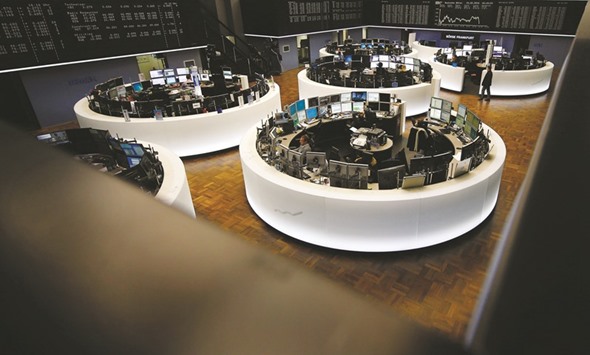Global stock markets were buoyed yesterday by firmer oil prices and after brighter-than-expected US growth data, as finance and banking chiefs from the world’s leading economies began talks.
European bourses followed a convincing session for Asia’s main indices as G20 finance ministers and central bankers gathered in Shanghai to thrash out remedies to kickstart growth.
Shares on Frankfurt’s DAX led the way, closing 1.95% up at 9,513.30 points, followed closely by Paris, which was up 1.56% at 4,314.57 points, and London, which was up 1.38% at 6,096 points at close. The Euro STOXX 50 ended up 1.83% at 2,930.05 points
US stocks were steady, off early highs, after stronger-than-expected US economic growth in the fourth quarter of last year, albeit confirming a sluggish expansion into 2016.
“Domestic stocks are adding to weekly gains following upbeat reads on US 4Q GDP (fourth-quarter gross domestic product), personal income and spending, and consumer sentiment,” analysts Charles Schwab said in a note to investors.
“Also, extended gains for crude oil prices are helping buoy stocks, along with an advance in Asia and an ensuing back-to-back rally in Europe,” it added.
Mike McCudden, head of derivatives at stockbroker Interactive Investor, said investors had ended the week “cautiously optimistic”, with all eyes on the G20 for clues to future action.
“With the G20 summit... and high expectations of bullish comments from the forum, investors are taking their cue to move with the hot air and push stocks higher.
“The oil price is the major motivator for movement,” he added.
Benchmark oil contract Brent North Sea crude rose back above $36 a barrel yesterday, boosting shares in energy companies.
Market-wide boosts came as officials from the Group of 20 industrialised nations gathered for a two-day meeting, with China’s sagging growth expected to loom over the discussions.
Pressure has meanwhile been mounting for central banks to let loose their monetary firepower to stimulate growth and reassure investors, after financial markets posted one of the worst starts to the year in living memory.
Japan has already adopted negative interest rates, the European Central Bank has embarked on its own huge stimulus programme, and the US Federal Reserve has signalled possible delays to interest rate rises.
But German Finance Minister Wolfgang Schaeuble set the stage for disputes at the Shanghai meeting when he said Europe’s largest economy opposes any G20 fiscal stimulus package.
In Japan, news that inflation fell to zero in January also raised expectations the Bank of Japan could ramp up its massive central bank bond-buying programme.

A view of the trading room at the Frankfurt Stock Exchange. Shares on Frankfurt’s DAX led the way yesterday, closing 1.95% up at 9,513.30 points.
